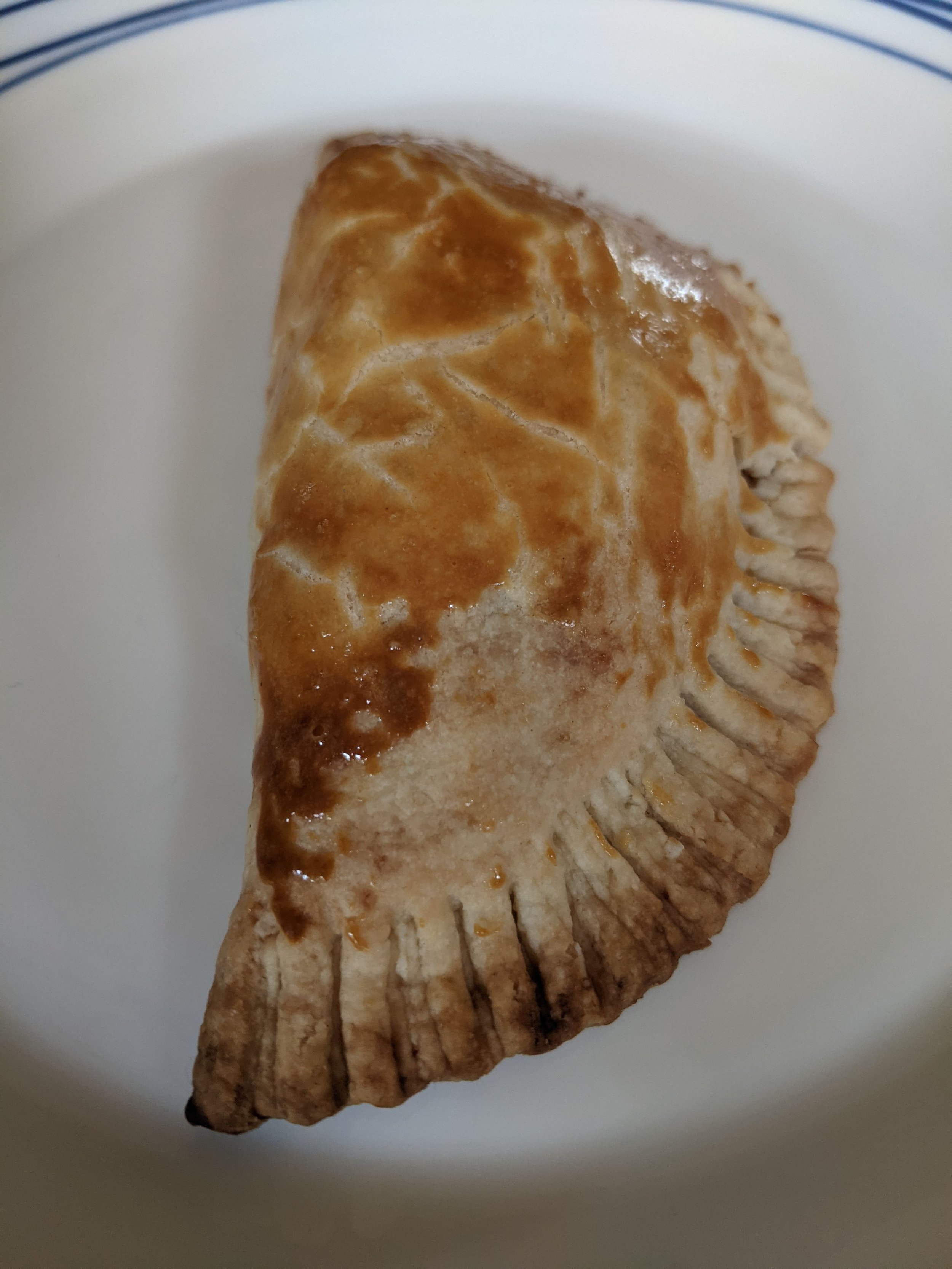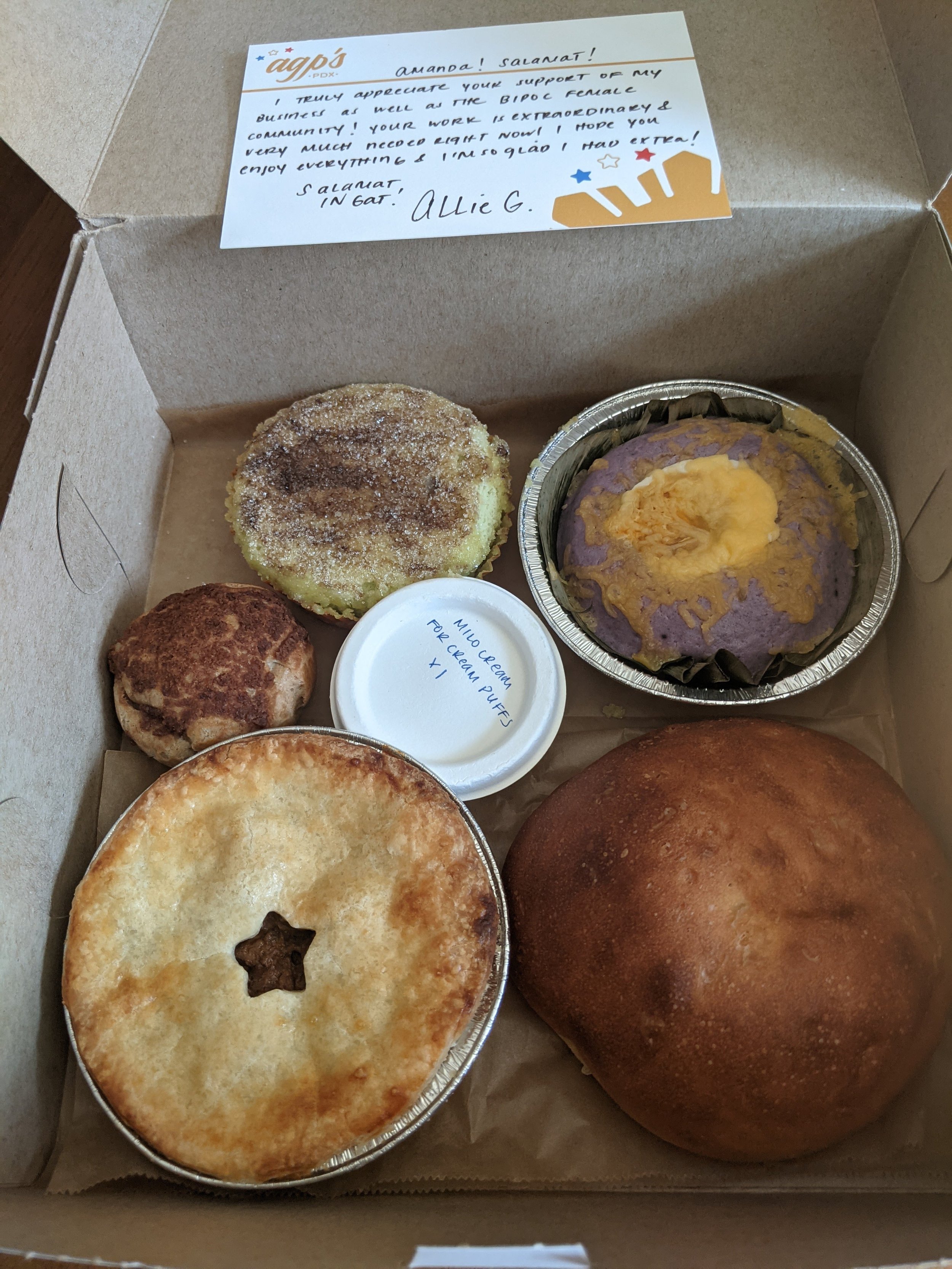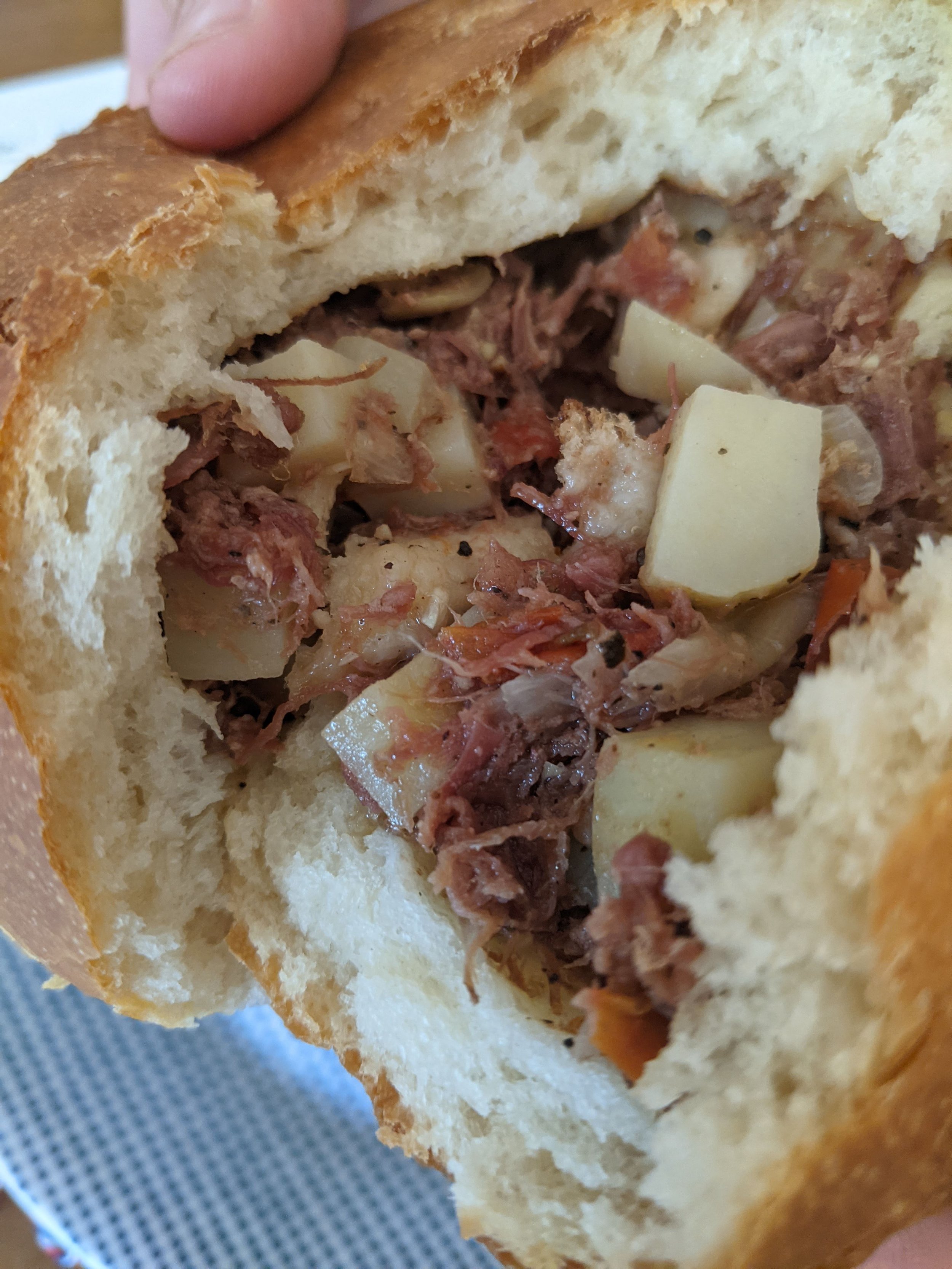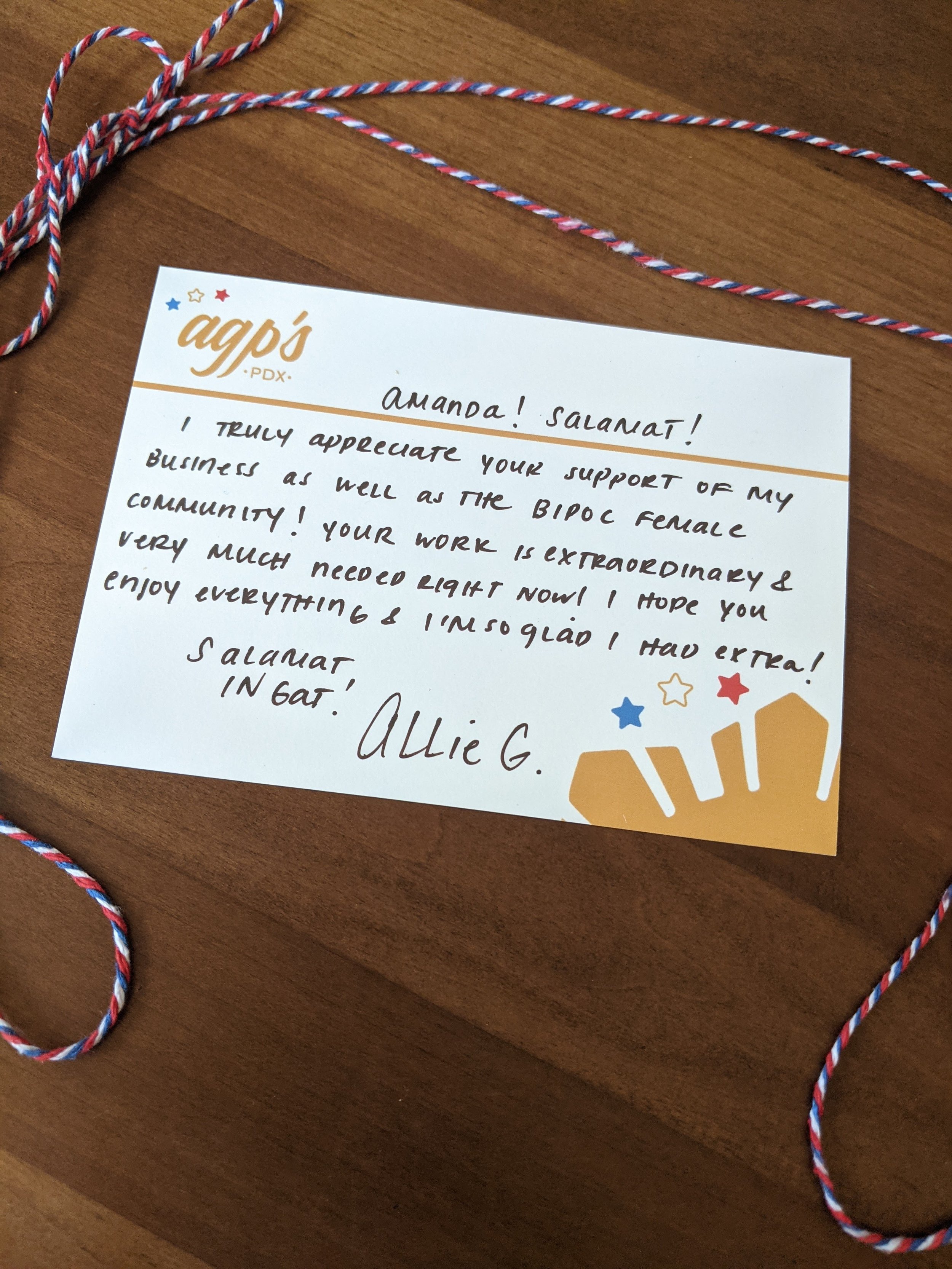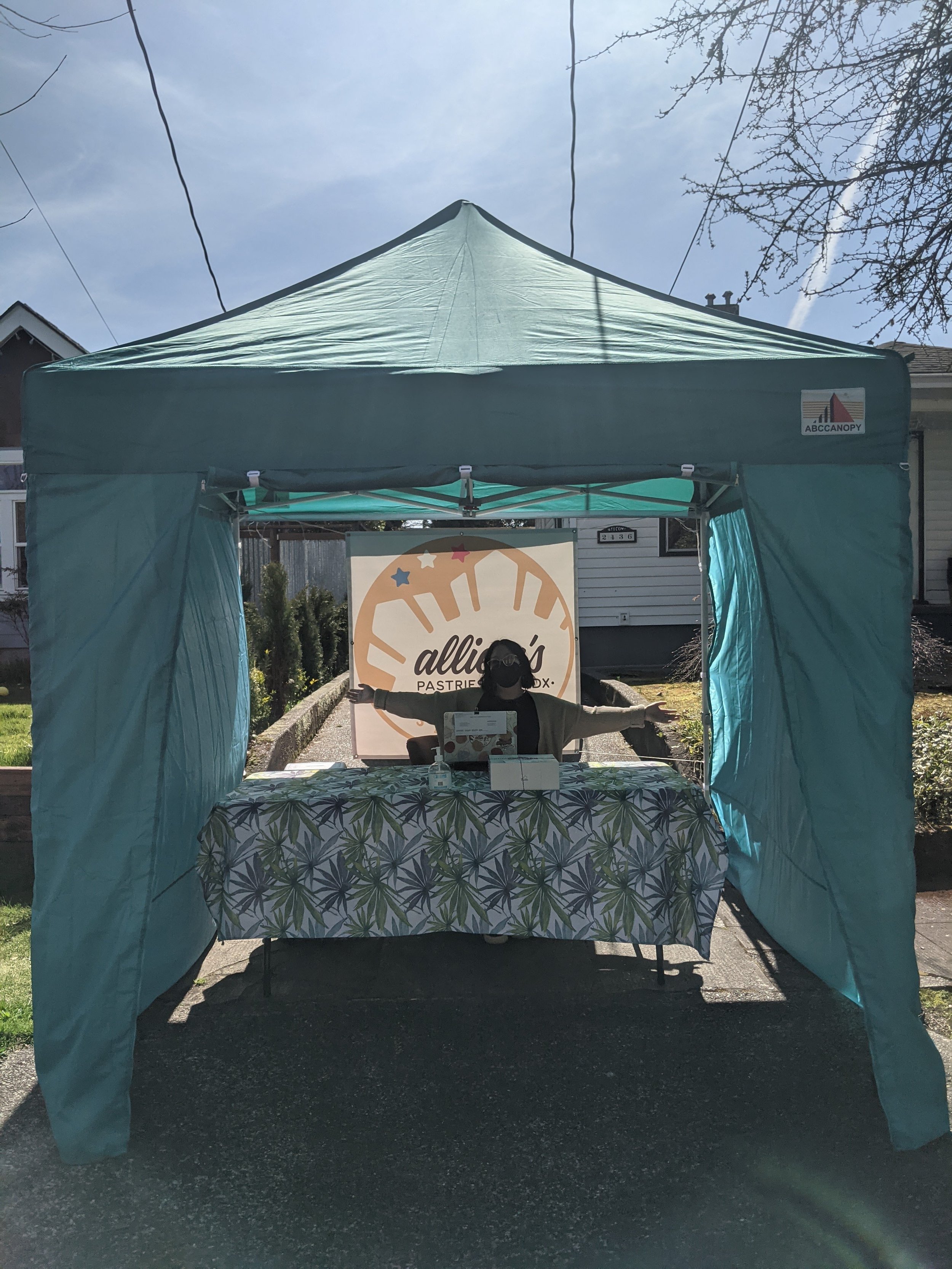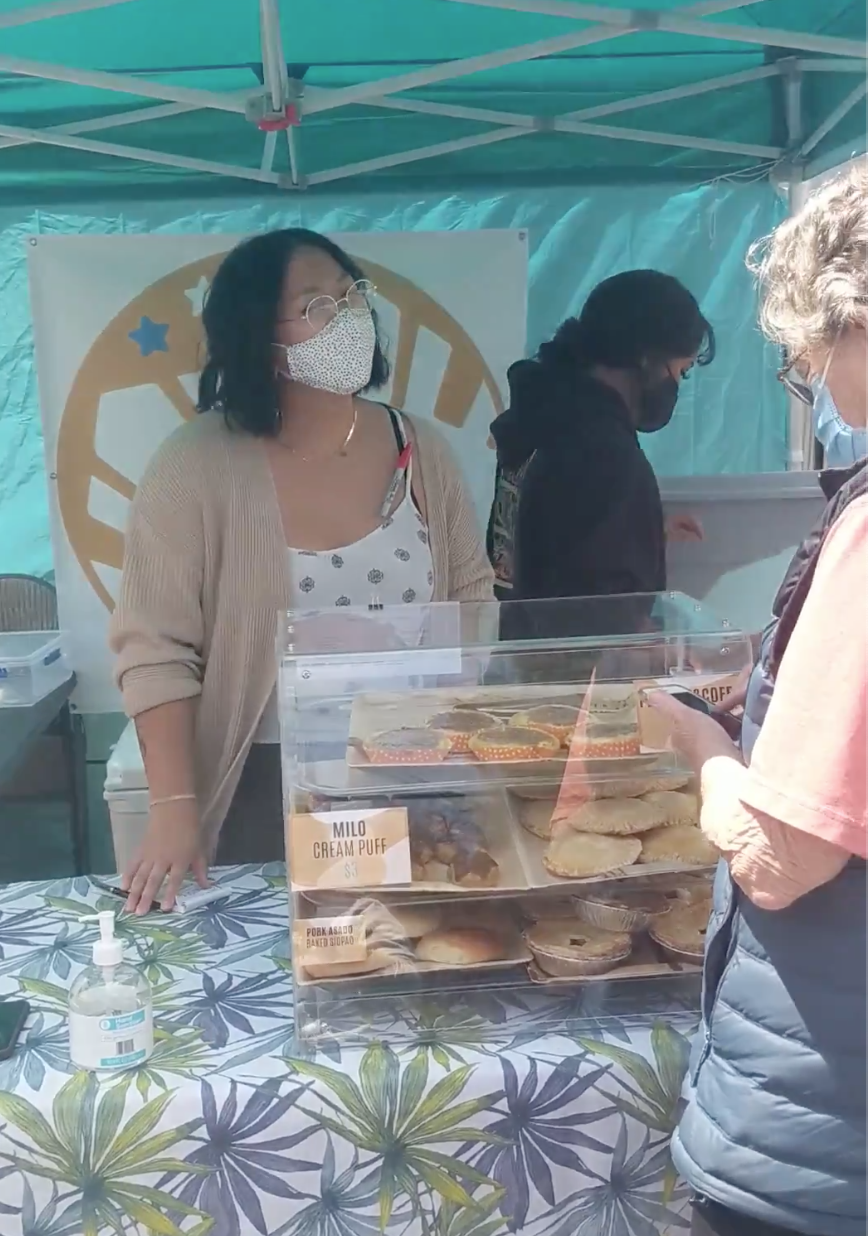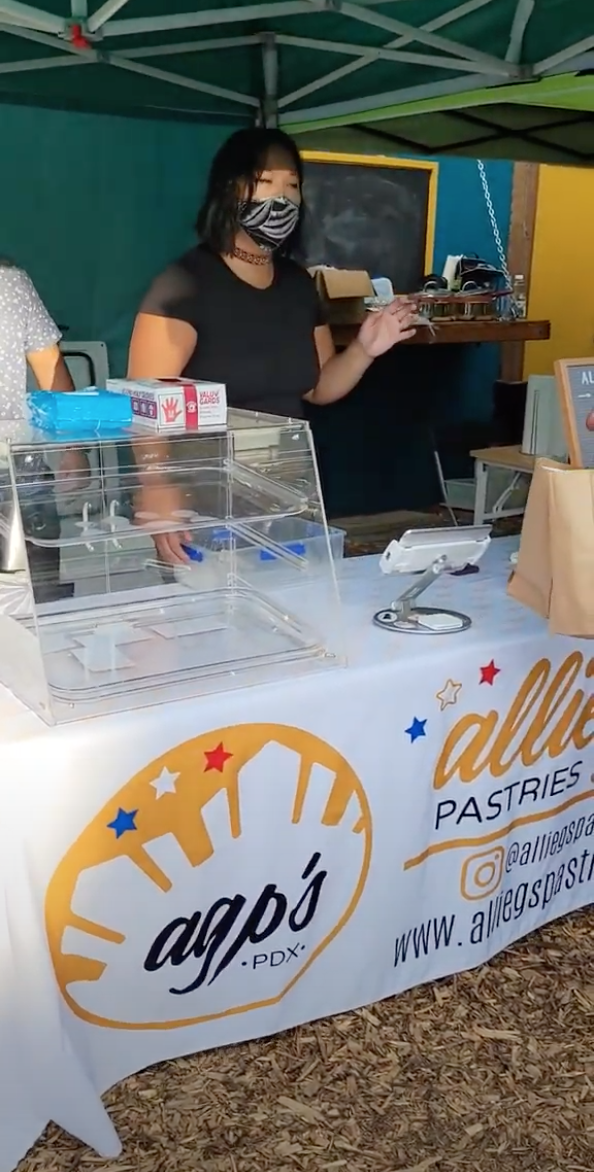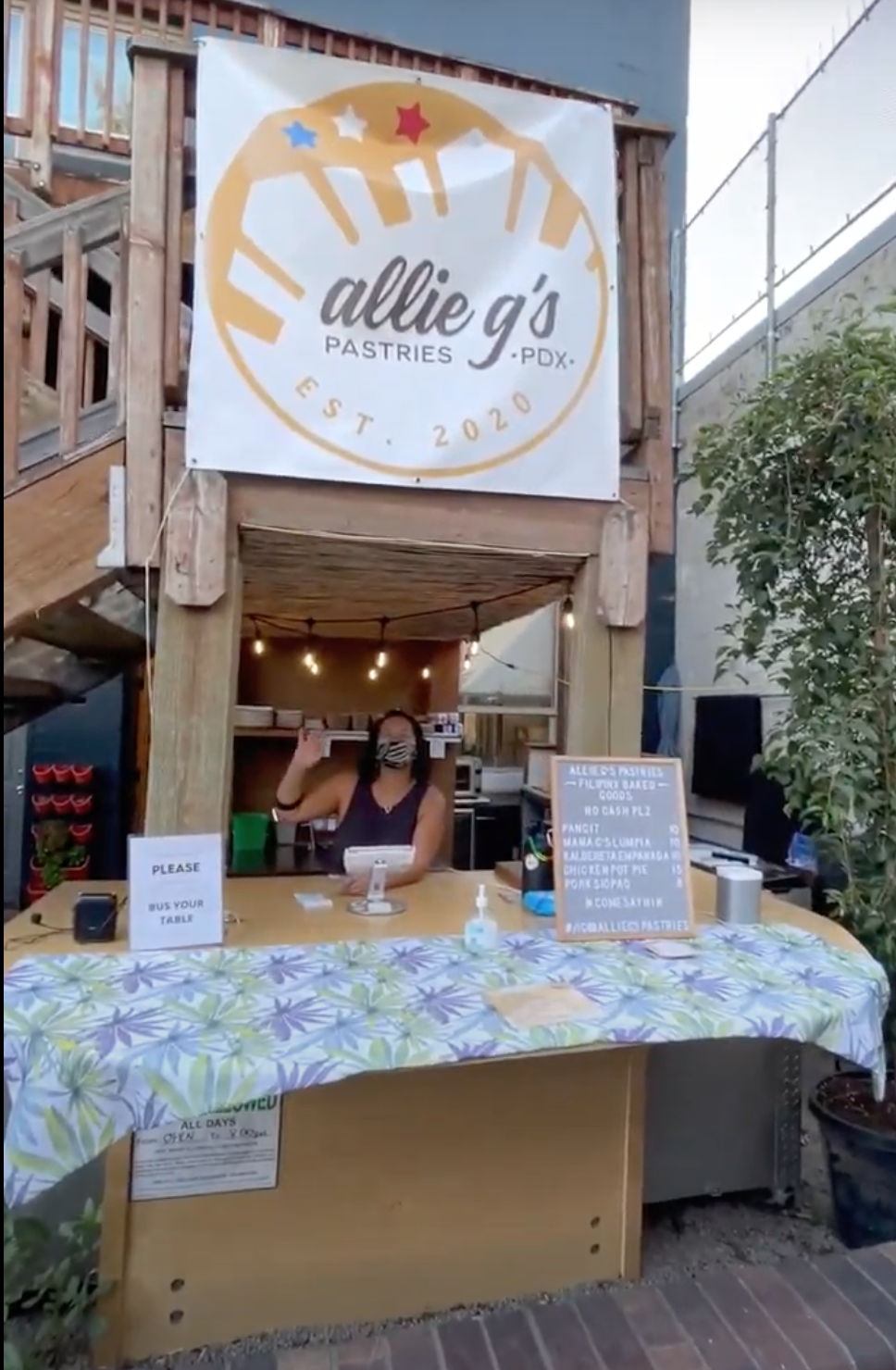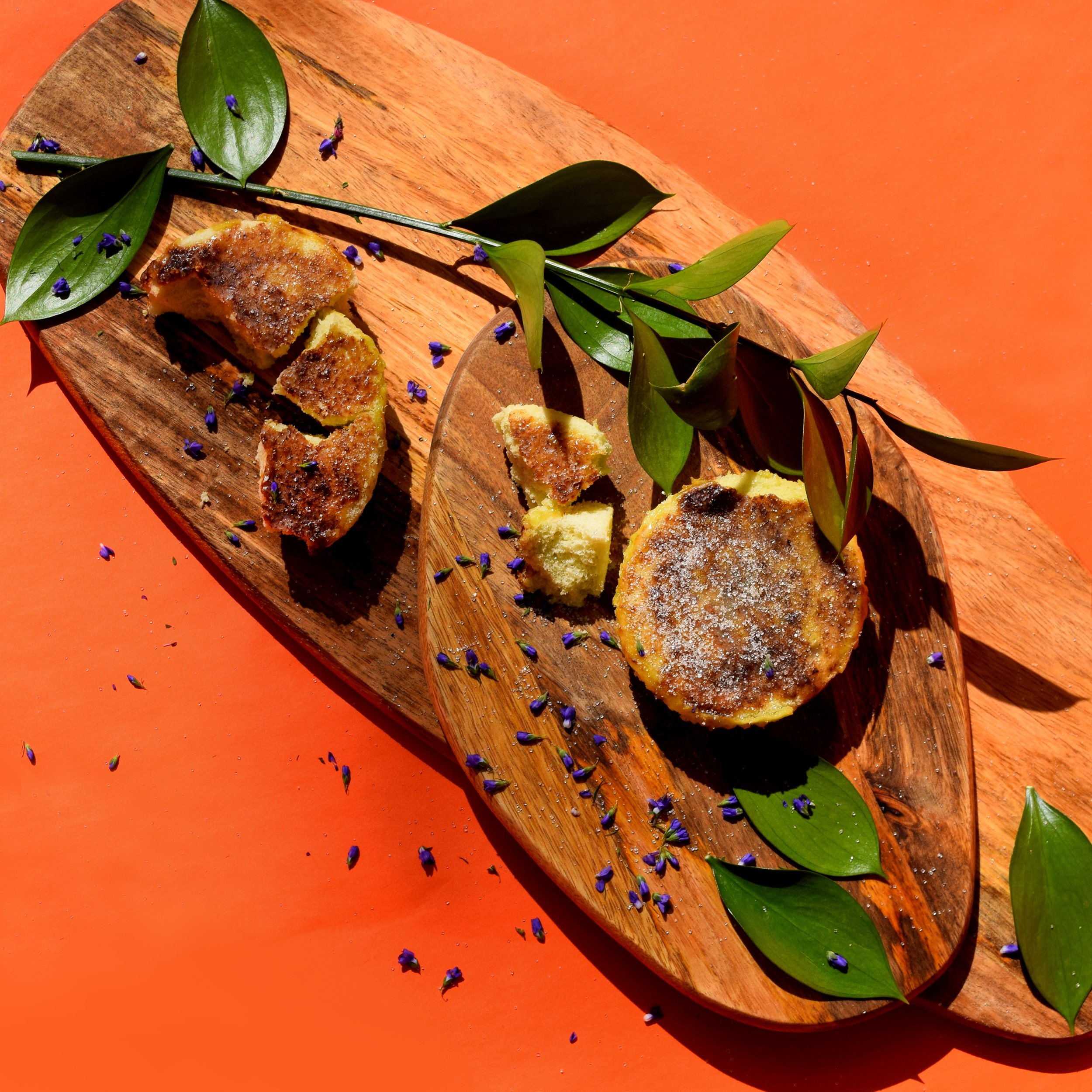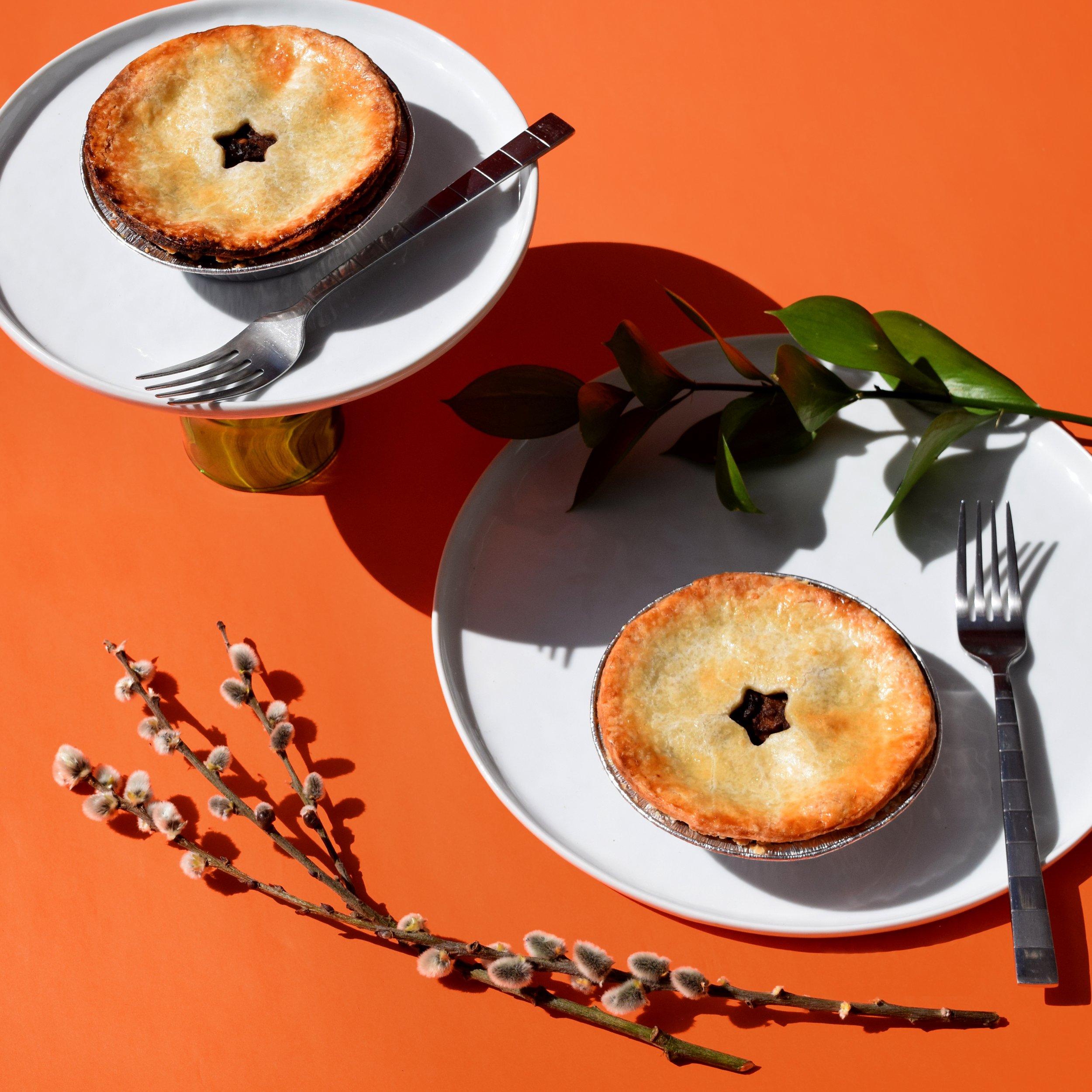Allie Guevarra, Founder and Owner of Allie G’s Pastries
ALIST Women-Owned Blog Series features the story of first-generation Filipina, Alexandria (Allie) Guevarra as she celebrates the 1 year anniversary of Allie G’s Pastries. Allie sits down with Amanda to share her path from Back of House Pastry Chef to Owner and Executive Chef of Portland’s newest Filipinx food sensation.
From Back of House
9 year old Allie dreamed of the whole Guevarra family owning and running a restaurant together. Her brother as the Executive chef, Allie the pastry chef, her mom the host, her sister the server and her father handling the money. Mixing the Betty Crocker box of ingredients, she’d make her cake, spread the frosting, and imagine.
It was a daydream that comforted Allie when she’d revisit the idea later in life. This make believe version of her family was a coping mechanism to help ease the trauma of witnessing and enduring the real life of growing up in her Hollister, California household. Being the only Filipina in her elementary school and the first American born child of a Filipino family of four, who immigrated from the Philippines in the ‘80s, left Allie in her own displacement.
Growing up in a country her family worked hard to assimilate into, created a divide. But cooking together was a bridge. Young Allie smashed the garlic, cut the onions, and made the rice, while the captain of the kitchen, her mom, directed her and her siblings in Tagalog. These moments gave Allie glimpses into Filipino culture through the food. Working in unison, with everyone playing their roles, the flavors of the Philippines filled the room. Allie absorbed it all and tucked it away.
“Allie G’s is an extension of myself.” Allie tells me. “I have a lot of emotion and feelings of pride in what I do.”
Allie G’s Pop Up at the Breathe Building for the Elevate BIPOC Market. Photo provided by Allie.
Allie is the owner and creator of Allie G’s Pastries, which celebrated its 1 year anniversary in November 2021. By April 2021, she was hosting her own bimonthly pop ups. Since then her popular Filipino/Filipinx classic dishes reimagined into minipies and handhelds, earned Allie a feature article in Eater Portland Magazine, an invitation to Taste For Equity, and a collaboration with Food & Wine Magazine’s Best New Chef for 2021, Carlo Lamagna.
Lani Sickman and Allie Guevarra at the Taste for Equity 2021. Photo from Taste for Equity.
I met Allie in March of 2021 at a Filipina meet up hosted by Leslie of Leslie’s Lumpia and Danielle of Danielle Nichole Events to celebrate International Women's Day. We all gathered on a long decorated table at Barrio (Portland Mercado). I was nervous. Not just because this was the first real busy public setting I’d sat in since sheltering in place due to COVID-19, but also wondering if I’d be accepted as a Filipina with only 50% Ilocano blood. Allie and Geleen of Shop Halo Halo immediately made me feel welcome when I sat down next to them. I’ve lived in Oregon since 1986 and it took 35 years to see this many Filipinx’s at one time, who weren’t my relatives. Plus, they are all women who own a small business. With each ticking minute, I felt a sense of belonging and as the stories were told I learned about the many shades of Filipina sitting around the table.
As we all got up to leave, Allie offered her pastries for us to take home and try. This is when I eyed her signature chicken adobo pot pie with a star punched in the center, but being a pescatarian I choose two of her vegetarian Kaldereta Empanadas filled with onions, tomatoes, carrots, potato, green bell pepper, chili, olives, and a whole lot of love tucked into a flaky and buttery crust. My siblings and I are the only cousins who didn’t grow up in a Filipino household. Visiting grandma during our summer breaks was our opportunity to taste Filipino food. When I broke open Allie’s empanada, I was transported back to my grandma’s kitchen with the rich smells of tomato-based stews simmering on her cooktop. I sat there and cried as I texted Allie. My brain doesn’t remember the names of dishes so I can’t go searching for recipes. But all my senses in that moment remembered these flavors, and it felt special.
A trained pastry chef, who left her art to chase better money in bartending, Allie found herself in the kitchen again after being laid off from the Multnomah Whiskey Library due to the pandemic. Longing for the flavors she grew up with, she started experimenting with marrying her love of baking and traditional Filipino dishes. The adobo pot pie and corned beef pandesal are my family’s personal favorites.
Allie explains, “The portable part is a nod to my childhood. I used to grab a warm pandesal, add whatever was on the stove, and head to my room.” A concept that translated well in the take away COVID culture. “Allie G’s brings flavors I grew up with to myself,” Allie laughs. “But also to others who have a memory and connection to the food. ”
My connection to her food is where our friendship began. Since then I’ve picked up Allie G’s Pastries from her driveway – where her pop ups started – the Nikkei Bake Sale, Wellspent Market’s AAPI Heritage Month Event, the Turo-Turo BBQ Filipinx Event at The Sideyard Farm, and the back patio of Derby. With each visit, I could see Allie get more and more inventive in her craft and the Filipino community from all backgrounds embraced her recipes.
As she reflects on this past year, I was excited to sit down and learn what brought 31 year old Allie to this point in her life.
“When you’re not financially stable for your whole life, it’s really hard for you to stop and take a breath to figure out what the fuck you’re doing because you’re constantly trying to make money.” Allie explained the way she felt unemployed.
Being laid off meant forced downtime for a woman who has been going mach 10 her whole life. With unemployment dollars being just enough to get by, Allie went back to what she loved. To ease the ache of feeling lost, she found herself in baking again.
“When I say my culture, I am referring to being first-generation and first-born Filipina-American in my family. It’s a specific experience I have that my sister, brother, mom, and dad don’t share. I grew up in the United States, but the rest of my family grew up in the Philippines. The countries are very different and although we all lived in the same house, I wasn’t taught Tagalog. English is actually my first language. I can understand Tagalog,” Allie takes a pause, “but I always felt like I wasn’t a part of the actual Filipinx culture.”
“In middle school, I just didn’t know who I was and I started attaching myself to people who I thought knew who they were,” Allie reflects. “I was trying to build my identity off of those people and none of them were positive people in my life. In fact, they did damage to my well-being. I just felt so lost. I didn’t even know what I liked. I only liked things because people around me liked things.”
I paused there and asked Allie if she could think back and give me a few examples of what did interest her growing up.
“I was really interested in playing the drums, but instruments and lessons were too expensive for my immigrant parents who did what they could to keep our family out of poverty. I also wanted to be a fashion designer. I would create clothes and styled drawings of people with things I liked, but my mom didn’t understand why I was interested in art. I then got into forensics because I thought pursuing something in the science field would get my parent’s support. My interest would build all through high school and I was able to get in AP Biology and AP Chemistry.”
Allie beamed when talking about all three childhood passions. Like they were still real today. But then her tone changed when explaining how it all became unreachable. As a kid, your education opportunities are formed by the adults in your life and their assigned place in a society; along with your access to food, shelter, clothes, healthcare, and even love. For some, this truth is quite evident in adolescence and for others it’s not even thought about. However, every self-aware kid goes through this rite of passage. The moment you realize where your opportunities measure up against those around you. And the feelings you harbor based on that truth can drive a wedge in your family, in your heart, and in your life. Because thanks to the oppressive systems we are born into and if we have a proximity to poverty, the odds of moving into a higher socioeconomic class diminishes quite rapidly. And just like that you’re having adult conversations with your child self about your future self, daydreaming of a different reality or even being someone different all together.
That’s what Allie did when she watched her brother, who is 10 years older than her, leave his job at the bank, take out a loan, pursue his dreams as a chef, graduate from culinary school, and land a job at Bouchon.
“When I saw my brother land that job, I was like, wow. I want that.” Allie lit up again. “And more importantly, I wanted to be in the same industry with him. I was 19 at the time.”
With no access to financial family support, a 4 year college wasn’t a path for Allie. Inspired by her brother and with the help of her aunt who co-signed on her loan, Allie went to culinary school too. After graduating from culinary school, 20 year old Allie had a falling out with her father and she lived with her brother for a few months before saving up enough money to rent a room.
“I fucking loved culinary school, but with the student loan debt and my first job paying minimum wage, it was tough to keep the passion. Even when I landed a job at Alexander’s, a 2 Michelin Star steakhouse, I was getting paid $14/hr. In California, this wasn’t enough to afford an apartment or even rent a bedroom.”
Hearing Allie say all this so matter-of-factly, struck me. Restaurants that have $250 dishes on the menu, but fail to pay living wages to their employees is wrong on so many levels. Even the labels of Front of House and Back of House are manipulative and set up a classist culture primed for abuse. And the truth is you need both front and back equally for a restaurant to really excel, but BOH are often paid less. In my opinion, establishments who exploit their employees don’t deserve badges of honor, good food or not.
Allie went on to describe her start in baking. “When I was a kid, my mom was always cooking. But when she was working, my brother would cook for the family. My thing was baking. I’d ask my mom for the Betty Crocker mix boxes and make a yellow cake with sprinkles and cream cheese frosting. I’ve always had a sweet tooth. Besides, dessert is the best part of a meal.”
Allie laughs as she tells me about a time in her life that she would go out with friends and eat dessert first because she didn’t want to get too full and miss out. I don’t have much of a sweet tooth so this cracks me up. She goes on to tell me her point of view on the subject.
“It’s because people forget about dessert and they don’t leave room at the end of their meal and they really miss out. You know? A lot my thinking came from working in back of house as a pastry chef. We do so much to make desserts great. Then we wait around to see if anyone is going to order and no one does. Pastry chefs are putting just as much labor and love into every little detail of our dish just like entrées and appetizers and ya’ll don’t wanna try it because you’re full.”
I swear, I will never look at a dessert menu, tray or cart quite the same. I typically don’t order dessert and sometimes my partner and I are sitting in the last few tables before the restaurant closes. I had no idea the pastry department is hanging out waiting to see if we’ll order something. The whole thing makes sense, but I tell Allie that I see her offering dessert first as an option in her future restaurant and we both laugh.
With little income coming in, Allie did a short stint at an animal hospital, as she contemplated leaving the industry. Part of the draw was the hospital had a little apartment for people staying the night to be with their animals. They told Allie she could rent it out if she stayed on for a year. Six months into the gig she was approached by the sous chef she worked with at Alexander’s. As new Executive chef of a sandwich shop called Spread, he needed her help. Even though she was sought out, Allie didn’t think to ask for more than $14/hr. Staying at this wage left her tied to unhealthy relationships, but kept a roof over her head. In fact, to no longer live with her partner she rented a room for $350/month in a household of six Christian women who had a bed open up.
“It was all I could afford so I moved into the house. I got baptized, did the daily 6am devotions and went to bible study three times a week.” Allie shared while shaking her head in disbelief. “It felt wrong. I was a shell of who I was. A fake. I wasn’t a Christian, but I had to do what I had to do because I needed a place to live.”
She scraped by and 1 1/2 years later she connected with the ex-Executive chef from Alexander’s. He already had a pastry chef, but he was looking for a bartender for his new restaurant and Allie made the leap.
“I loved bartending. I was a lot more of a personable person and it was nice to talk to people at the bar. Skills I learned in culinary school helped me in the bar program. For instance, I was the first one to use a gastrique as an ingredient in a cocktail at Orchard City Kitchen. This was before shrubs became popular. The success I was having made me feel like this is where I belonged. I could use the skills I learned being in back of house, but being in front of house and making a lot more money at $30-$40/hr with tips.”
During this time, Allie was living with a partner who wanted to chase his idea of living the lifestyle of a Portlander and move to Oregon for a fresh start. Even though the money coming in from bartending was better, Allie bought into the idea. Motivated by proving her independence to the world and mostly her family, while also wanting to be free of feeling stuck, Allie made the move. At 26 years old, she left California and her family for the first time in her life.
“I didn’t love Portland, but it was affordable. I searched for a month before I got my first job at Loyal Legion. They could only offer me two days a week so I also worked at High Noon and Toro Bravo’s event space Plaza del Toro, which both places are now closed. I got the connection to work at the Multnomah Whiskey Library through people I knew back in California. After interviewing with the bar manager and then staged for a week [a working interview for free], I was offered the position as bar back to start that evening.”
With hierarchy very much in place at the Whiskey Library, going from interviewed to hired doesn’t happen. In fact, that was the first time that ever happened at the Library and needless to say the other employees didn’t like it. But that night Allie met Jordan, her partner, who was a host there and he didn’t seem to mind. [wink]
Within three months she was promoted to cocktail server, six months later she was made bartender, and 1.5 years in she was assigned lead bartender. Money was good, but the work environment wasn’t great. Before she was let go, due to the pandemic, she became the lead trainer and designed the process and education manuals needed to train the hosts and bar backs into the role of bartenders.
Fall of 2020 was the first time Allie really came up for air. The slow down filled her mind with thoughts she never really processed while she raced towards financial independence. Choosing herself and opening her own business, especially with a money scarcity mentality, was a huge milestone for Allie.
Throughout her life she moved from prep cook for her mom, to pastry chef, to meat curer, to bar back, to lead bartender, to owner and creator of Allie G’s. Now the head cook of her own kitchen she has a new connection with her mom.
“It’s been really nice to have conversations with my mom while I’m perfecting my recipes. I may have been around her cooking most of my life, but I never got to watch her orchestrate a dish. I was usually running around setting the table or washing the dishes. Now I get to call my mom for advice on my menu. Food is where we can relate. Where we connect.”
It may not be the family restaurant she dreamed of, but it’s a new dynamic with Allie as the Executive chef. The quiet love language of her family’s relationship to food is a bond and Allie G’s brought them closer. It brought Allie home. Through her young passions of being both a creative and a scientist, Allie transformed into the baker she is today. The path was winding and it wasn’t without social conditioning, but her ability to retreat inward, as means of protection, preserved beautiful parts of Allie that would later thrive in the right environment. What incredible patience and persistence. That part is definitely in her blood. With each knead of the dough, Allie’s confidence and pride in her identity grows, as she heals and shifts from living in true survival mode. And in doing so, she starts to make room for the love she’s been unable to receive. From herself, her family, and the community.
Thank you, Alexandria Guevarra for sharing your story with me. Welcome home.
From Left to Right: Jomar Guevarra, Sabrina Guevarra, Jordan Valls, Allie Guevarra, Maria-Izza Guevarra, and Maricel Guevarra.
If you would like to support Allie, please visit her website at https://www.alliegspastries.com/
Photo credit: Allie G’s Pastries product photos are by Anisa El-Khouri.
ABOUT THE WRITER
Amanda Mailey is the owner of ALIST and a new indie author who released her first book sidetracked in July 2020. She’s a lifelong writer specializing in observation and reflective narrative. She grew up in Oregon and graduated with a journalism degree from the University of Oregon.
As a mixed race Filipina-American woman, Amanda is passionate about advancing women- and bipoc-owned small businesses and leaders in her community. Through this blog series and social media, Amanda centers and promotes the stories and achievements of local women owners.




